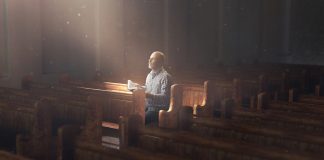The One Who emptied Himself
Some moments in life fade quickly, like ephemeral portraits in the memory's archive. Others, though we have never witnessed them, haunt us and force us to reconsider our perception of life, time, and our shadow self.
Joy is the face of Jesus
I still remember the shock I felt when I first watched "The Gospel According to Matthew," starring Bruce Marchiano. It was not the first film about the life of Jesus that I had seen, but it was entirely different from anything I had known before.
The Magi of our world
"I love those who love me, and those who seek me find me" (Proverbs 8:17).
Change and stability in religion
Professor Bailey V. Gillespie, from La Sierra University's Department of Theology and Christian Character in California, impressed me with both the diversity of his interests and his prestigious achievements, particularly in the field of young people's religious experience.
The pursuit of signs and miracles
Back when I was a student, I heard this joke that, despite being funny, made me stop and think. It went something like this: a man starts hearing an "inner voice" telling him to sell his house, move to Bucharest, and use all the money to bet on a black 13 at roulette. The man complies without question because the voice spoke with...
The face of a love that waits at the gates of Heaven
With Jesus, it was always different. For most of my life, I could only see God the Father through a legalistic filter. But with Jesus, it was always different.
Simeon and Anna: From waiting to fulfilment
Some expectations dissolve into routine or turn into despair, while others invigorate life. The former are measured in deeds and desires, while the latter are measured in faithfulness and beliefs.
The face that transforms me
Every time I look through the lens of a microscope, I am struck by the realisation that beyond what the naked eye can see lies a universe far deeper and richer.
Never forgotten by His heart
The sermons. My mother’s stories. The little sand table and Sabbath School for children. Adults’ conversations about religion. All the information I absorbed in childhood helped me sketch an image of Jesus with one major flaw: it was rendered in far too many shades of grey.
The shadow of the throne
In the heart of the most powerful man in Judea, a greater fear than any other was born: the fear of losing control. Herod's story could be our story.
The end of the world—and humility
“They pour out arrogant words; all the evildoers are full of boasting” (Psalm 94:4).
Zechariah: From disbelief to praise
When prayers go unanswered, faith can turn to disbelief and hope to scepticism. On the other hand, God can intervene at unexpected moments, providing unexpected answers, as happened in Zechariah's life.
Autumn also has its spring
Sometimes, life is a succession of questions that God seems to ignore—until, at the right time, His silence provides an answer that is better than any answer in the world.


























